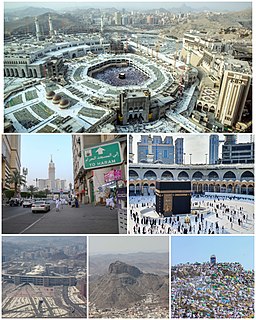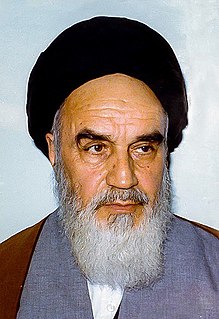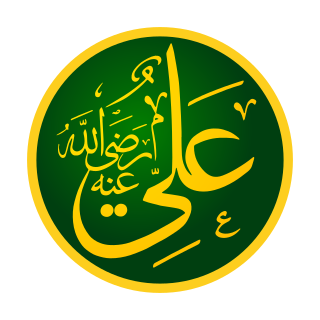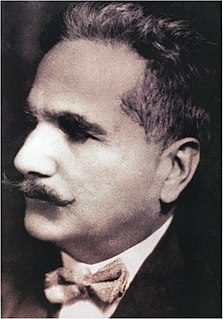Moulana Tayyeb Saheb is the Imam or current spiritual head of the Atba-e-Malak Vakil group of Mustaali Ismaili Shi'a Islam. [1]
| |
| Part of a series on Islam Isma'ilism |
|---|
 |
Moulana Tayyeb Saheb is the Imam or current spiritual head of the Atba-e-Malak Vakil group of Mustaali Ismaili Shi'a Islam. [1]

Allah is the common Arabic word for God. In the English language, the word generally refers to God in Islam. The word is thought to be derived by contraction from al-ilāh, which means "the god", and is linguistically related to the Aramaic words Elah and Syriac ܐܲܠܵܗܵܐ (ʼAlāhā) and the Hebrew word El (Elohim) for God.
A fatwā is a legal ruling on a point of Islamic law (sharia) given by a qualified jurist in response to a question posed by a private individual, judge or government. A jurist issuing fatwas is called a mufti, and the act of issuing fatwas is called iftāʾ. Fatwas have played an important role throughout Islamic history, taking on new forms in the modern era.

Jinn – also romanized as djinn or anglicized as genie – are invisible creatures in early pre-Islamic Arabian religious systems and later in Islamic mythology and theology. Like humans, they are accountable for their deeds, can be either believers (Muslim) or unbelievers (kafir); depending on whether they accept God's guidance. Since jinn are neither innately evil nor innately good, Islam acknowledged spirits from other religions and was able to adapt spirits from other religions during its expansion. Jinn are not a strictly Islamic concept; they may represent several pagan beliefs integrated into Islam. To assert a strict monotheism and the Islamic concept of Tauhid, Islam denies all affinities between the jinn and God, thus placing the jinn parallel to humans, also subject to God's judgment and afterlife. The Quran condemns the pre-Islamic Arabian practise of worshipping the jinn, or seeking protection from them.

The Hijri calendar, also known in English as the Muslim calendar and Islamic calendar, is a lunar calendar consisting of 12 lunar months in a year of 354 or 355 days. It is used to determine the proper days of Islamic holidays and rituals, such as the annual fasting and the annual season for the great pilgrimage. In almost all countries where the predominant religion is Islam, the civil calendar is the Gregorian calendar, with Syriac month-names used in the Levant and Mesopotamia but the religious calendar is the Hijri one.

Muhammad ibn Abdullah was an Arab religious, social, and political leader and the founder of the world religion of Islam. According to Islamic doctrine, he was a prophet divinely inspired to preach and confirm the monotheistic teachings of Adam, Abraham, Moses, Jesus, and other prophets. He is believed to be the Seal of the Prophets within Islam. Muhammad united Arabia into a single Muslim polity, with the Quran as well as his teachings and practices forming the basis of Islamic religious belief.

Mecca, officially Makkah al-Mukarramah and commonly shortened to Makkah, is a city and administrative center of the Mecca Province of Saudi Arabia, and the holiest city in Islam. It is 70 km (43 mi) inland from Jeddah on the Red Sea, in a narrow valley 277 m (909 ft) above sea level. Its last recorded population was 1,578,722 in 2015. Its estimated metro population in 2020 is 2.042 million, making it the third-most populated city in Saudi Arabia after Riyadh and Jeddah. Pilgrims more than triple this number every year during the Ḥajj pilgrimage, observed in the twelfth Hijri month of Dhūl-Ḥijjah.

Sayyid Ruhollah Musavi Khomeini, better known as Ayatollah Khomeini, was an Iranian political and religious leader who served as the first supreme leader of Iran from 1979 until his death in 1989. He was the founder of the Islamic Republic of Iran and the leader of the 1979 Iranian Revolution, which saw the overthrow of Shah Mohammad Reza Pahlavi and the end of the Persian monarchy. Following the revolution, Khomeini became the country's first supreme leader, a position created in the constitution of the Islamic Republic as the highest-ranking political and religious authority of the nation, which he held until his death. Most of his period in power was taken up by the Iran–Iraq War of 1980–1988. He was succeeded by Ali Khamenei on 4 June 1989.
Shīʿa Islam or Shīʿīsm is the second-largest branch of Islam. It holds that the Islamic prophet Muhammad designated ʿAlī ibn Abī Ṭālib as his successor (khalīfa) and the Imam after him, most notably at the event of Ghadir Khumm, but was prevented from succeeding Muhammad as the leader of the Muslims as a result of the choice made by some of Muhammad's other companions (ṣaḥāba) at Saqifah. This view primarily contrasts with that of Sunnī Islam, whose adherents believe that Muhammad did not appoint a successor before his death and consider Abū Bakr, who was appointed caliph by a group of senior Muslims at Saqifah, to be the first rightful (rāshidūn) caliph after Muhammad. Adherents of Shīʿa Islam are called Shīʿa Muslims, Shīʿītes, or simply Shīʿa or Shia.

Sufism, also known as Tasawwuf, is a mystic body of religious practice, found mainly within Sunni Islam but also within Shia Islam which is characterized by a focus on Islamic spirituality, ritualism, asceticism and esotericism. It has been variously defined as "Islamic mysticism", "the mystical expression of Islamic faith", "the inward dimension of Islam", "the phenomenon of mysticism within Islam", the "main manifestation and the most important and central crystallization" of mystical practice in Islam, and "the interiorization and intensification of Islamic faith and practice".

Sharia is a body of religious law that forms part of the Islamic tradition. It is derived from the religious precepts of Islam and is based on the sacred scriptures of Islam, particularly the Quran and the Hadith. In Arabic, the term sharīʿah refers to God's immutable divine law and is contrasted with fiqh, which refers to its human scholarly interpretations. The manner of its application in modern times has been a subject of dispute between Muslim fundamentalists and modernists.

The Umayyad Caliphate was the second of the four major caliphates established after the death of Muhammad. The caliphate was ruled by the Umayyad dynasty. Uthman ibn Affan, the third of the Rashidun caliphs, was also a member of the clan. The family established dynastic, hereditary rule with Muawiya ibn Abi Sufyan, long-time governor of Greater Syria, who became the sixth caliph after the end of the First Fitna in 661. After Mu'awiyah's death in 680, conflicts over the succession resulted in the Second Fitna, and power eventually fell into the hands of Marwan I from another branch of the clan. Greater Syria remained the Umayyads' main power base thereafter, with Damascus serving as their capital.

Deobandi is a revivalist movement within Sunni Islam, adhering to the Hanafi school of law, formed in the late 19th century around the Darul Uloom Madrassa in Deoband, India, from which the name derives, by Muhammad Qasim Nanautavi, Rashid Ahmad Gangohi, and several others, after the Indian Rebellion of 1857–58. The movement pioneered education in religious sciences through the Dars-i-Nizami associated with the Lucknow-based ulema of Firangi Mahal with the goal of preserving Islamic teachings under colonial rule. The Deobandi movement's political wing, Jamiat Ulema-e-Hind, was founded in 1919 and played a major role in the Indian independence movement through its propagation of the doctrine of composite nationalism.

ʿAlī ibn Abī Ṭālib was a cousin, son-in-law and companion of the Islamic prophet Muhammad. He ruled as the fourth rightly guided caliph from 656 until his assassination in 661. He is one of the central figures in Shia Islam as the first Shia Imam and in Sunni Islam as the fourth of the "rightly guided" (rāshidūn) caliphs. He was the son of Abu Talib and Fatimah bint Asad, the husband of Fatima, and the father of Hasan, Husayn, Zaynab, and Umm Kulthum.

A caliphate or khilāfah is an Islamic state under the leadership of an Islamic steward with the title of caliph, a person considered a political-religious successor to the Islamic prophet Muhammad and a leader of the entire Muslim world (ummah). Historically, the caliphates were polities based on Islam which developed into multi-ethnic trans-national empires. During the medieval period, three major caliphates succeeded each other: the Rashidun Caliphate (632–661), the Umayyad Caliphate (661–750), and the Abbasid Caliphate (750–1258). In the fourth major caliphate, the Ottoman Caliphate, the rulers of the Ottoman Empire claimed caliphal authority from 1517. Throughout the history of Islam, a few other Muslim states, almost all hereditary monarchies such as the Mamluk Sultanate (Cairo) and Ayyubid Caliphate, have claimed to be caliphates.

Islamic schools and branches have different understandings of Islam. There are many different sects or denominations, schools of Islamic jurisprudence, and schools of Islamic theology, or ʿaqīdah (creed). Within Islamic groups themselves there may be differences, such as different orders (tariqa) within Sufism, and within Sunnī Islam different schools of theology and jurisprudence. Groups in Islam may be numerous, or relatively small in size. Differences between the groups may not be well known to Muslims outside of scholarly circles, or may have induced enough passion to have resulted in political and religious violence. There are informal movements driven by ideas as well as organized groups with a governing body. Some of the Islamic sects and groups regard certain others as deviant or not truly Muslim. Some Islamic sects and groups date back to the early history of Islam between the 7th and 9th centuries CE, whereas others have arisen much more recently or even in the 20th century. Still others were influential in their time but are not longer in existence.

Islam is an Abrahamic monotheistic religion, centred primarily around the Quran, a religious text that is considered by Muslims to be the direct word of the God of Abraham as it was revealed to Muhammad, the main and final Islamic prophet. It is the world's second-largest religion with more than two billion followers, comprising around 25 percent of the global population. Islam teaches that God is merciful, all-powerful, and unique, and has guided humanity through various prophets, revealed scriptures, and natural signs, with the Quran serving as the final and universal revelation and Muhammad serving as the "Seal of the Prophets". The teachings and practices of Muhammad documented in traditional collected accounts provide a secondary constitutional model for Muslims to follow after the Quran.

The Islamic State (IS), also known as the Islamic State of Iraq and the Levant, Islamic State of Iraq and Syria, and by its Arabic acronym Daesh, is a militant Islamist group and former unrecognized quasi-state that follows the Salafi jihadist branch of Sunni Islam. It was founded by Abu Musab al-Zarqawi in 1999 and gained global prominence in 2014, when it drove Iraqi security forces out of key cities during the Anbar campaign, which was followed by its capture of Mosul and the Sinjar massacre.

The Kaaba, also spelled Ka'bah or Kabah, sometimes referred to as al-Kaʿbah al-Musharrafah, is a building at the center of Islam's most important mosque, the Masjid al-Haram in Mecca, Saudi Arabia. It is the most sacred site in Islam. It is considered by Muslims to be the Bayt Allah and is the qibla for Muslims around the world when performing salah.

Sir Muhammad Iqbal, was a South Asian Muslim writer, philosopher, and politician, whose poetry in the Urdu language is considered among the greatest of the twentieth century, and whose vision of a cultural and political ideal for the Muslims of British-ruled India was to animate the impulse for Pakistan. He is commonly referred to by the honorific Allama.

The Supreme Leader of Iran, also referred to as Supreme Leader of the Islamic Revolution, but officially called the Supreme Leadership Authority, is the head of state and the highest political and religious authority of the Islamic Republic of Iran. The armed forces, judiciary, state television, and other key government organisations such as Guardian Council and Expediency Discernment Council are subject to the Supreme Leader. According to article 110 of the constitution, the Supreme Leader delineates the general policies of the Islamic Republic. The current lifetime officeholder, Ali Khamenei, has issued decrees and made the final decisions on the economy, the environment, foreign policy, education, national planning, and other aspects of governance in Iran. Khamenei also makes the final decisions on the amount of transparency in elections, and has dismissed and reinstated presidential cabinet appointees.